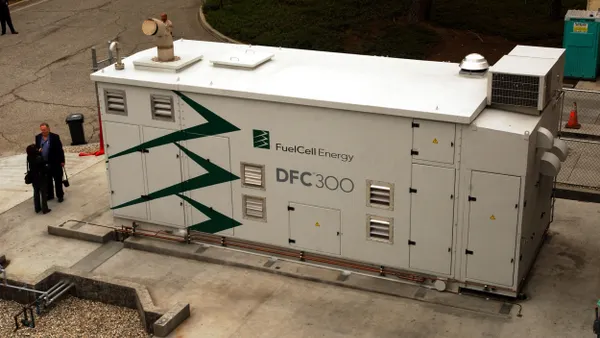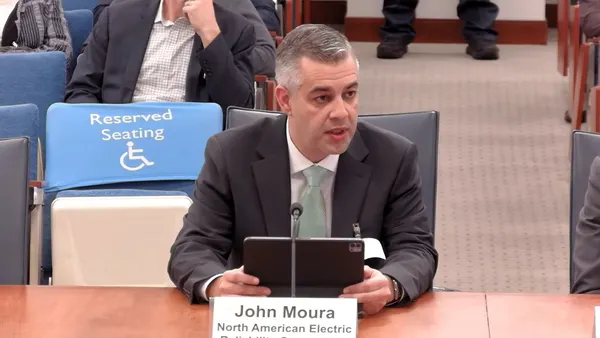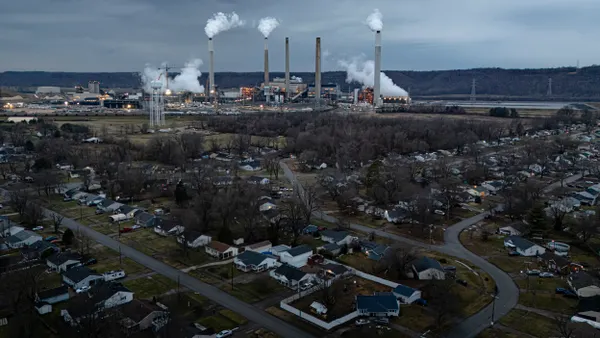Dive Brief:
- The California Air Resources Board last week published a “preliminary” list of entities, including electric utilities, that may be required to report emissions and climate risk data to the state starting next year.
- The Climate Corporate Data Accountability Act requires companies with total annual revenues of more than $1 billion that do business in California to report Scope 1, 2 and 3 greenhouse gas emissions in line with the Greenhouse Gas Protocol. The Climate‐Related Financial Risk Act requires entities that do business in the state and have total annual revenues exceeding $500 million to file climate-related financial risks every other year. Both laws were signed in 2023.
- While the list was intended to provide clarity, it is “generating surprise and confusion among the regulated (and non-regulated) community, some of whom expected to find themselves on the list, and others who did not,” according to a memo from the law firm Troutman Pepper Locke. In a followup email to Utility Dive, attorneys at the firm said "until such time as CARB proposes regulations, utilities are in the same boat as the rest of the potentially regulated community and are waiting to see what requirements CARB will mandate.”
Dive Insight:
The list of covered entities includes electric utilities, energy companies and manufacturers. Pacific Gas and Electric, Southern California Edison, Centerpoint Energy Resources, Dominion Energy Services, DTE Energy Services, Puget Sound Energy, NRG Energy, Sunova, Sunrun, Mitsubishi Power Americas, Berkshire Hathaway Energy, Siemens, General Electric, Hitachi Energy and many more are named. The list also includes Sierra Pacific and Nevada Power, which in 2008 began doing business as NV Energy.
CARB emphasized in its release that each potentially regulated entity remains responsible for compliance, “regardless of whether it was included in staff’s preliminary list or outreach.” The agency is seeking stakeholder feedback to validate its list through a voluntary survey tool available on its website.
Law firm Ropes & Gray found that out of approximately 4,150 listed entities, many are duplicates; for some of those duplicates, there were inconsistencies in CARB’s assessment of whether they were covered. The preliminary list does not appear to reflect potential exemptions the laws outline or those that agency staff discussed during previous stakeholder workshops, it added.
Law firm Vinson & Elkins issued a similar conclusion. The preliminary list “is almost certainly both overinclusive and underinclusive of companies that have undergone various business combinations, restructurings, or renamings of corporate entities, and likely fails to appropriately account for various unique corporate ownership structures,” it states on its website.
So far, California’s climate reporting laws have survived court challenges, paving the way for implementation. However, the Trump administration’s retreat from climate data collection and monitoring underscores “the widening gap between state and federal approaches to the issue,” Capstone said in a note earlier this month, which could complicate enforcement.
On Aug. 13, U.S. District Court Judge Otis Wright II rejected a bid for a preliminary injunction from the U.S. Chamber of Commerce, which argued the laws violate the First Amendment. In his ruling, Judge Wright said disclosure requirements are a permissible exercise of the state’s interest in climate transparency. A trial in that case is scheduled to begin Oct. 20. Capstone said it expects companies will have to comply in the near term.
“Capstone believes the ruling represents a notable legal victory for these laws, clearing a major hurdle for their implementation,” it said. “The decision raises the likelihood of significant compliance costs for regulated emitters.”
It also pointed to two other developments that could impact the rollout of the new regulations.
The first is the U.S. Securities and Exchange Commission’s announcement in March that it would stop defending its climate disclosure rule in court.
“We expect the conservative Supreme Court would be likely to overturn the rule, which is likely contributing to the Trump administration’s facilitating the case continuing by declining to take regulatory action to repeal the rule,” Capstone said.
It also cited the U.S. Environmental Protection Agency’s apparent decision to withdraw its support for the U.S. Environmentally-Extended Input-Output model.
“The model, which is the third most viewed database on Data.gov, allows companies to calculate their supply-chain greenhouse gas (GHG) emissions using environmental and economic data, making it a critical tool for corporate reporting and for designing strategies to reach net-zero targets,” Capstone said.















